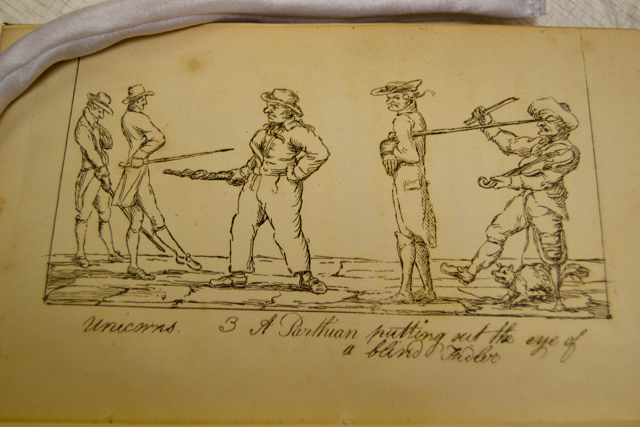
Author
Solomon Supplejack
Title
Hints to the Bearers of Walking Sticks and Umbrellas
Published
London: Printed for J. Murray, Fleet Street; and J. Harding, St. James’s Street; and A. Constable and co. Edinburgh, 1808
Location
827.7 FM3177

What is this book about?
Hints to the Bearers of Walking Sticks and Umbrellas traces the history of both implements back into antiquity, accrediting the probable contrivance of the walking stick to Adam. As part of an in-depth examination of the correct use of canes and umbrellas, some of the common culprits behind their mishandling are satirically categorised and vividly rendered in the accompanying illustrations.
These include ‘the sky-striker’ who raises his umbrella to the heavens upon passing a fellow pedestrian ‘whereby the shorter endangers with the points of his whalebone the eyes of the taller’. Further public menace is presented by the ‘shield-bearer’ who ‘drives his Umbrella before him, covering completely his head and body. He can see no one in front, and he occupies the whole pavement: he either runs against every one before him, or compels them to step into the gutter’.

Another offender is ‘the Unicorn’ whose ‘formidable horn projects, and forces a passage through the crowd for the resolute charger’. Our final of these ‘vulgar swaggerers’ is ‘the Parthian’ who, by fixing ‘the head of their cane or umbrella close under their arm’, recklessly places the ‘inadvertent or dim-sighted follower’ at risk of stabbing ‘his eye against the pointed ferule, which, like a reverted spear, wounds those who follow, instead of those who meet its bearer’.
Why does this book matter?
It serves as a still pertinent manual for the correct handling of sticks and umbrellas. Its tone is facetious and amusing, but it is also genuinely considered and cultured in its literary references and analysis of the mathematical principles involved. This is not surprising given that Supplejack is a pseudonym for John Shute Duncan, who would go on to become keeper of the Ashmolean Museum, Oxford. As well as being a charming curio, this book also offers a valuable insight into early nineteenth-century humour and social commentary.
This blog post was written by Adam Gilbert.

